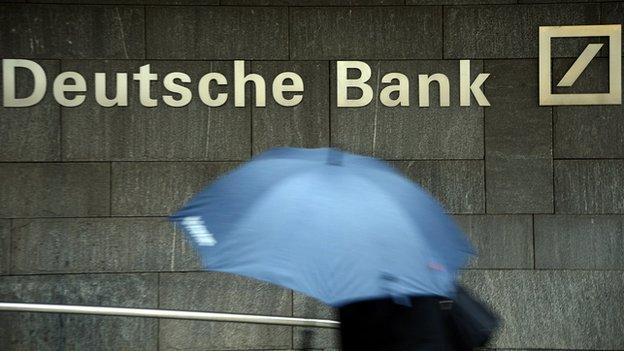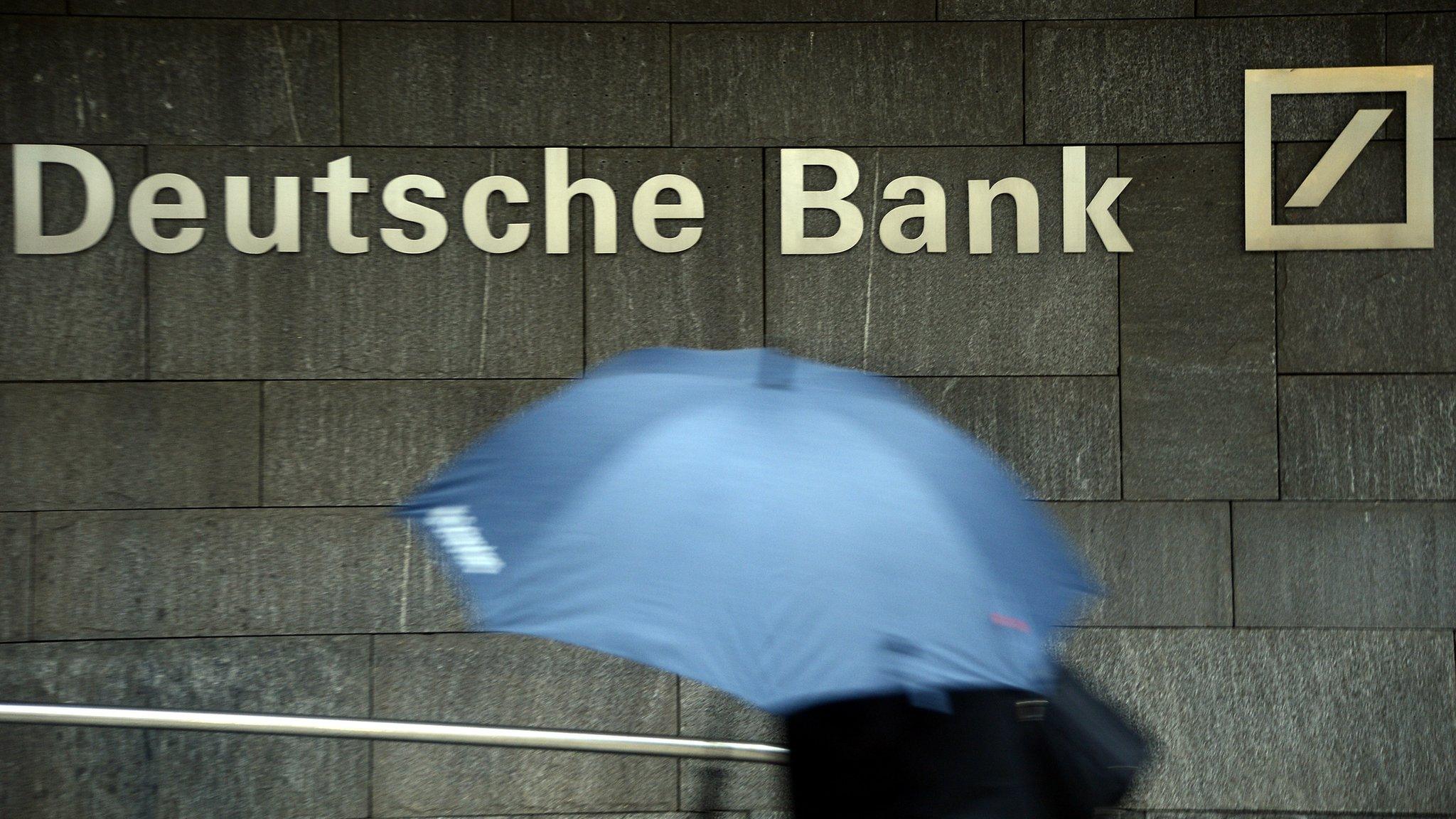Deutsche Bank in record $2.5bn fine over interest rate manipulation
- Published

Deutsche Bank has been fined $2.5bn (£1.66bn) by US and UK regulators for trying to manipulate interest rates.
The German bank has been fined $2.1bn by US regulators, and £227m by the UK's Financial Conduct Authority.
The fine relates to manipulation of the Libor and Euribor inter-bank rates.
It is a record penalty for such misconduct because Deutsche tried to mislead regulators and could have hampered investigators. The bank said it "deeply regrets" the matter.
Deutsche said in a statement, external that it had "disciplined or dismissed individuals" involved and tightened governance controls. However, US regulators have demanded the dismissal of a further seven senior individuals still employed.
'Deeply ingrained'
Georgina Philippou, the FCA's acting director of enforcement and market oversight, said in a statement, external: "This case stands out for the seriousness and duration of the breaches by Deutsche Bank - something reflected in the size of today's fine.
"One division at Deutsche Bank had a culture of generating profits without proper regard to the integrity of the market. This wasn't limited to a few individuals but, on certain desks, it appeared deeply ingrained."
"Deutsche Bank's failings were compounded by them repeatedly misleading us. The bank took far too long to produce vital documents and it moved far too slowly to fix relevant systems and controls," she said.
The FCA said, external that in one instance, Deutsche in error destroyed 482 tapes of telephone calls that should have been kept. "Deutsche Bank also provided inaccurate information to the regulator about whether other records existed," the FCA said.
The misconduct involved at least 29 Deutsche Bank individuals, including managers and traders, mainly based in London but also in Frankfurt, Tokyo and New York. It took place between 2005 and 2009.
'Fundamental'
Libor and Euribor are benchmark interest rates, influencing the setting of other rates. They are used as a barometer to measure the health of the banking system and as a gauge of market expectation for future central bank interest rates.
The FCA said they "are fundamental to the operation of both UK and international financial markets".
To set Libor, for example, leading banks submit the rate at which they would lend to each other, with the average rate published each day.
But traders colluded to set these benchmark rates, hoping to improve their trading positions. The regulators released email exchanges between traders and submitters - the people who provide the information on which rate Libor and Euribor is set each day.
One exchange said: "Can we have a high 6mth libor today pls gezzer?" The submitter agreed, "Sure dude, where wld you like it mate ?"
In another exchange about how the rates are set, one banker said: "people just randomly make those numbers up".
The New York Department of Financial Services said, external that Deutsche still employs some people who were involved, and has demanded their dismissal.
About 10 individuals have already had their employment ended, the DFS said, but it added: "However, certain employees involved in the wrongful conduct remain employed at the Bank.
"The Department orders the Bank to take all steps necessary to terminate seven employees, who played a role in the misconduct but who remain employed by the Bank: one London-based Managing Director, four London-based Directors, one London-based Vice President, and one Frankfurt-based Vice President."
'Regret'
Deutsche Bank did not comment in its statement on the demand for further dismissals. In joint remarks, Jürgen Fitschen and Anshu Jain, co-chief executives, said: "We deeply regret this matter but are pleased to have resolved it. The Bank accepts the findings of the regulators.
"We have disciplined or dismissed individuals involved in the trader misconduct; have substantially strengthened our control teams, procedures and record-keeping; and are conducting a thorough review of the Bank's actions in addressing this matter."
Regulators around the globe have imposed fines and penalties on banks for wrongdoing, from misselling insurance products to market manipulation.
Last year, six banks were fined £2.6bn over their traders' attempted manipulation of foreign exchange rates. A report this month by accountants KPMG estimated that the UK's largest banks have paid 60% of their profits since 2011 in fines and repayments to customers.
All money collected in fines by the FCA goes to the Treasury, apart from a small percentage used to administer charges. The current running total since 1 January 2015 is just over £411m.

Email evidence of how Deutsche traders tried to get rates fixed
"I'm begging u, don't forget me… pleassssssssssssssseeeeeeeeee… I'm on my knees…"
"can we have a high 6mth libor today pls gezzer?" And the answer? "sure dude, where wld you like it mate ?"
"Make sure our libors are on the low side for all ccys [currencies]."
"ok will try to give you a belated Christmas present…!" A trader promises to do his best to fix a rate
Tibor [an inter-bank rate] is a corrupt fixing and DB is part of it!" What one Deutsche vice president told a trader
- Published22 April 2015
